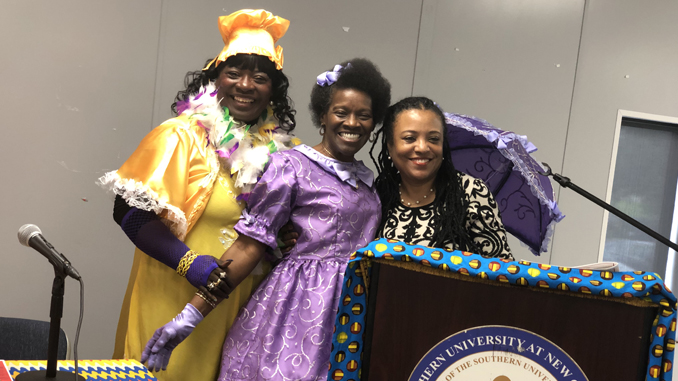
By Edward Carter, III
Data News Weekly Contributor
The Baby Dolls emerged in segregated areas around Uptown, then became a mainstay during Mardi Gras around 1912, and are now known to be one of the first women’s masking organizations in the city, even the country. It is a group that is considered a sisterhood, supporting women’s empowerment, that still exists. For Black History Month, Southern University at New Orleans paid tribute to the legacy of the Baby Dolls as it marked “African American Carnival History” on Feb. 25.
The event brought local baby dolls Connie Abdul-Salaam, Diane Honoré, Merline Kimble, Rosaline Theodore and Denise Trepagnier together with Kim Vaz-Deville, the author of “Walking Raddy: The Baby Dolls of New Orleans” who is a professor of Education and the associate dean of the College of Arts and Sciences at Xavier University.
“My grandmother said masking Baby Dolls was the most fun she had in her entire life,” said Merline “The Gold Digger” Kimble, the granddaughter of an original “Gold Digger” Baby Doll. She said that she grew up watching her grandmother happy and having fun masking, and that sense of joy intrigued her about the tradition.
“And if this was the most fun time she was having in her life, then I was interested,” she said. Kimble said this first hand experience is what got her excited about masking Baby Dolls.
“Once you put on the costume, that Baby Doll costume, you are no longer shy, you are no longer camera shy and you really enjoy it,” said Baby Doll Denise Trepagnier.
Current Baby Dolls said they continue to maintain the practice the way the original Baby Dolls did. The celebration of womanhood and sisterhood and the freedom to express themselves during Mardi Gras is a tradition they want to pass on to future Baby Dolls, they said.
“I’d like to see more of our youth masking and costuming. I’d like to see our children enjoy Mardi Gras as we did,” Trepagnier said. “I’d like to see the Mardi Gras come back to when it was families,” she added.
They acknowledged that while some things are changing today for traditional masking, they believe the essence of the Baby Dolls in the community is something that is still relevant today.
“The whole thing is about comradery and giving back to the community,” said Baby Doll Dianne “Gumbo Marie” Honoré. “We come together and we share that same spirit,” she said.
Most Baby Dolls work to improve the community year round and not just during Mardi Gras. Honoré, for instance, is the founder of the Amazons, a group who participates in community service and charity work. Vaz Deville, who has written about the Baby Dolls, emphasized that despite decades since they started, it was still important for the public to know what the Baby Dolls represent.
“It is something that is over 100 years old. It is a way that people express themselves and for them to know they are important. It is a way for them to make their neighbors have a good time because their neighbors weren’t included in Mardi Gras,” Vaz-Deville explained.
Recommended For You.



Be the first to comment